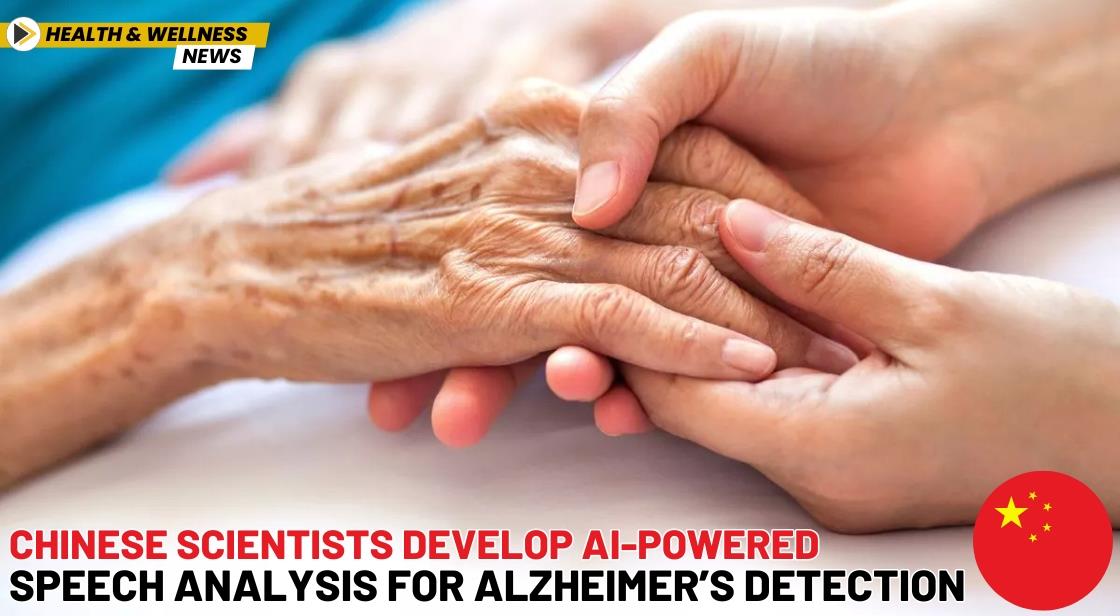Chinese Scientists Develop AI-Powered Speech Analysis for Alzheimer’s Detection

News Synopsis
In a significant advancement for medical science, Chinese researchers have introduced a pioneering voice-based method designed to tackle language-related challenges and enable the early detection of Alzheimer’s disease.
The research, conducted by a team led by Prof. Li Hai at the Hefei Institutes of Physical Science under the Chinese Academy of Sciences, aims to address the growing concerns surrounding Alzheimer’s, particularly as the global population ages. According to the experts, Alzheimer’s is becoming more prevalent worldwide, making early detection critical for improving patient outcomes and potentially slowing disease progression.
The Link Between Language Decline and Alzheimer’s
Experts have long recognized that language decline is often one of the earliest indicators of cognitive impairment. In a paper published in the IEEE Journal of Biomedical and Health Informatics, Prof. Hai’s team highlights how speech and language analysis could revolutionize early detection efforts.
Currently, available automated speech analysis tools provide a non-invasive, cost-effective approach to identifying cognitive disorders. However, existing methods face challenges such as:
-
Complexity in analysis and interpretation
-
Limited integration of diverse speech and cognitive data
-
Reduced accuracy in real-world applications
These limitations restrict the effectiveness of traditional Alzheimer’s detection models, prompting the need for a more advanced and adaptable framework.
Introducing the DEMENTIA Framework: A Breakthrough in Alzheimer’s Screening
To overcome these challenges, Prof. Hai’s team developed an innovative AI-powered solution called the DEMENTIA framework.
How Does the DEMENTIA Framework Work?
“This innovative approach integrates speech, text, and expert knowledge using a hybrid attention mechanism, significantly enhancing both the accuracy and clinical interpretability of Alzheimer’s disease detection,” the researchers said.
The DEMENTIA model is designed to analyze complex speech patterns and cognitive markers, improving detection precision. It utilizes:
-
Advanced Large Language Model (LLM) technologies
-
Hybrid attention mechanisms for analyzing multimodal interactions
-
A deep-learning-based scoring system to predict cognitive function
By combining speech patterns with linguistic and expert data, this framework offers enhanced interpretability—a major breakthrough in the clinical application of AI for Alzheimer’s detection.
Clinical Impact: Early Detection and Cognitive Function Prediction
With its AI-driven adaptability, the DEMENTIA framework is not only capable of detecting early cognitive decline but also predicting cognitive function scores.
Additionally, the system has demonstrated strong performance in interpretability analyses, proving its value as a decision-support tool for healthcare professionals. Researchers believe this AI model could soon become an integral part of Alzheimer’s screening, helping doctors detect symptoms long before severe memory loss and cognitive decline set in.
“The findings underscore the potential of speech-based tools for early Alzheimer’s disease screening and monitoring cognitive decline,” the team said.
Understanding Alzheimer’s: The Global Impact of Dementia
Alzheimer’s disease is a progressive neurodegenerative disorder that destroys memory, cognitive abilities, and essential mental functions. It is the leading cause of dementia, accounting for around 75% of all dementia cases.
Key Global Statistics on Alzheimer’s:
-
Approximately 55 million people worldwide suffer from dementia.
-
60 to 70% of dementia cases are linked to Alzheimer’s disease.
-
The number of Alzheimer’s cases is expected to triple by 2050, according to the World Health Organization (WHO).
Given the lack of a definitive cure, early detection through speech-based AI models could revolutionize dementia care by providing an accessible and cost-effective screening method.
Conclusion
With the introduction of the DEMENTIA framework, researchers are moving a step closer to developing AI-powered solutions that can detect Alzheimer’s early, predict cognitive function scores, and improve clinical decision-making. By leveraging speech-based tools, this approach paves the way for better patient outcomes and a stronger fight against the global Alzheimer’s epidemic.
As AI and machine learning continue to transform healthcare, innovations like the DEMENTIA framework could become vital tools in early Alzheimer’s screening and cognitive monitoring, offering hope to millions worldwide.
You May Like









